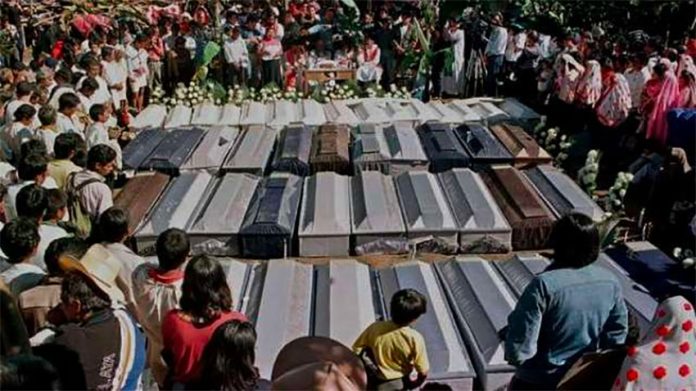Mexico has formally apologized for the government’s role in the killing of 45 indigenous people in Acteal, Chiapas, in 1997.
The apology is part of a friendly settlement agreement in which Mexico has pledged to offer reparations to families of the victims. They will include scholarships, paving roads, improvements to medical facilities, the construction of water and electrical infrastructure, creating a documentary of the events surrounding the attack and financial compensation to victims’ family members.
The government’s admission of guilt comes nearly 23 years after the December 22, 1997, massacre, in which paramilitary groups brutally killed members of a Tzotzil Mayan pacifist organization known as Las Abejas (The Bees), supporters of the Zapatista National Liberation Army, as they sought refuge in a church.
Pregnant women had their abdomens opened with bayonets and the fetuses ripped from womb while still alive. Eighteen children were among the dead.
The gunmen numbered more than 100 paramilitaries, adherents of the governing Institutional Revolutionary Party (PRI), who were armed and trained by the Mexican army.
After the massacre, soldiers were called in to remove the bodies of the dead in the predawn hours before the media arrived, evidence was tampered with and the mass slaughter was officially dismissed by the federal government as inter-communal violence.
The Ministry of the Interior’s human rights point man, Alejandro Encinas, offered the apology, which was translated into Tzotzil and delivered to a room filled with family members of the victims.
“On behalf of the Mexican state, we assume responsibility for the unfortunate acts against the Acteal community on December 22, 1997,” he said, offering “a public apology to the victims, to their families, to the Acteal community and to the Tzotzil people for this deep injury. We do it with conviction and without conditions; we do it because of the omissions and negligence of the Mexican state.”
The head of the ministry’s human rights defense unit, Aarón Mastache Mondragón, noted that the signed agreement contains four reparation measures that will be implemented through 25 actions as compensation.
“The act of recognition and the signing of the agreement represents an emblematic event. It reflects the commitment of the government of Mexico to seek and implement friendly solutions as a vehicle to achieve unity and peace,” he said.
On behalf of the survivors and relatives of the victims, Las Abejas spokesman Fernando Luna Pérez accepted the public apology, because “the Tzotzil people have a huge heart, we are a people of peace,” he said.
Luna also requested a trial for the massacre’s intellectual authors, citing former president Ernesto Zedillo’s role as the mastermind of “a crime against humanity,” as well as other high-ranking government officials at the state and federal levels.
Source: Milenio (sp), Pulitzer Center (en)
